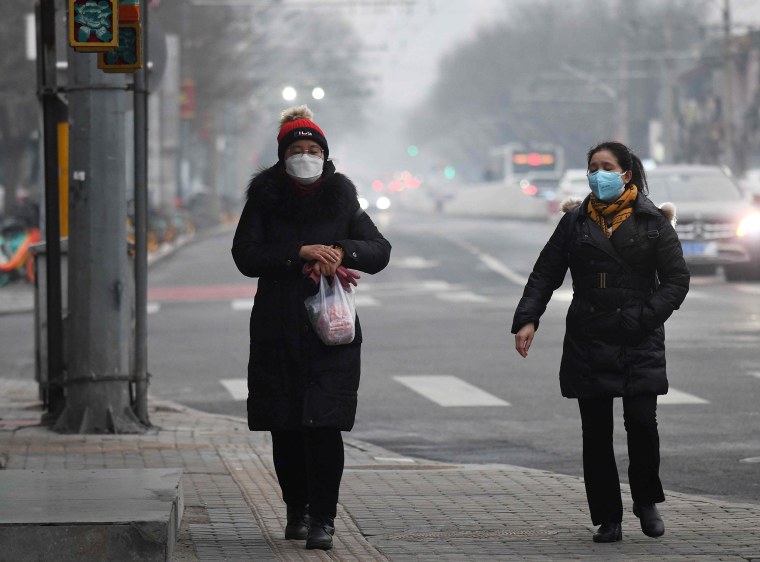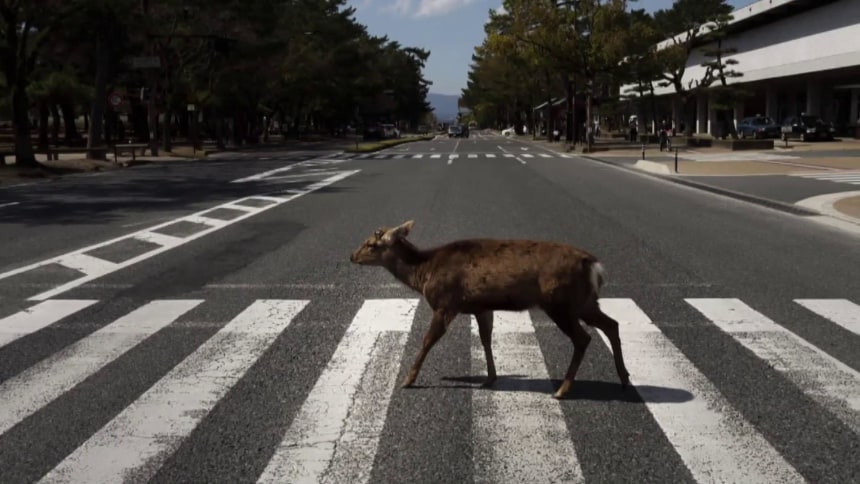We now need to turn these COVID-19 truths of heeding experts, protecting the most vulnerable and prioritizing public health into action on climate change.

Women wear face masks to protect against COVID-19 on a polluted day in Beijing on Feb. 20, 2020.Greg Baker / AFP - Getty Images
April 22, 2020 By Gina McCarthy, former administrator of the Environmental Protection Agency
I never imagined we’d mark the 50th anniversary of Earth Day amid a global pandemic and facing our biggest challenge yet: climate change. Yet, here we are.
A half-century ago, our country faced another grave crisis. Oil spills were smothering our coastlines and beaches. Pollution from smokestacks was destroying our forests. Car emissions inflamed our lungs. Toxic chemicals choked our rivers.
We faced a choice. Watch this crisis fester and deepen — or learn from it and change our ways.
Great leaders don’t wish away a virus or bluster their way out of a problem. They don’t pile on media briefings that misinform and confuse.
Twenty million Americans from all walks of life joined the first Earth Day and demanded we fix this problem together. And that’s just what we did.
Our leaders put aside politics and passed bedrock environmental safeguards to protect clean water and air. They created the U.S. Environmental Protection Agency and empowered the Department of the Interior to defend public waters, lands and all they support.
Great leaders don’t wish away a virus or bluster their way out of a problem. They don’t pile on media briefings that misinform and confuse. Rather, they learn from a crisis, roll up their sleeves and get to work applying those lessons to reduce other threats — just as we did 50 years ago when we marched in the streets for the first Earth Day.

VIDEO How the global lockdown is affecting our environment APRIL 22, 2020 03:47
People have stood up and beaten the unbeatable battles before. Thanks to the public health and environmental protections born out of the first Earth Day, we saved the ozone layer. We solved the acid rain crisis. We got lead out of gasoline. We brought endangered species back from the brink. Our health, our communities, our wild places are better off because of it.
We can do it again. As we look to the future, it is critical we rely on science, respond to threats as they gather; and act early to protect the most vulnerable. We need to demand this of our government.
That’s how our democracies work — from the bottom up. Every big leap forward started this way. It’s happening again right now — with millions of young people across the world standing up and demanding a better future.
Because the planet doesn’t give a damn if people survive. We do.
The COVID-19 and climate crises underscore a similar reality — we’re all vulnerable, we’re all connected and we must all work as one to solve them. If we want to hand our kids a better world, we better acknowledge three hard truths and change our ways:
First of all, COVID-19 is forcing us to confront the terrifying example of what goes wrong when our leaders fail to act on science. The Centers for Disease Control and Prevention was out early on pandemic response, setting up a COVID-19 Incident Management System on Jan. 7. Yet, President Donald Trump spent two months playing down the threat of the virus, predicting “like a miracle, it will disappear,” and urging Americans to “just stay calm, it will go away.”
Whether it’s a coronavirus, lead in drinking water or the growing damage inflicted by climate change, responding to public health challenges starts with our leaders listening to the science and following where it leads. We cannot be misled or forced to accept willful ignorance at our own expense or our children’s future.
April 22, 2020 By Gina McCarthy, former administrator of the Environmental Protection Agency
I never imagined we’d mark the 50th anniversary of Earth Day amid a global pandemic and facing our biggest challenge yet: climate change. Yet, here we are.
A half-century ago, our country faced another grave crisis. Oil spills were smothering our coastlines and beaches. Pollution from smokestacks was destroying our forests. Car emissions inflamed our lungs. Toxic chemicals choked our rivers.
We faced a choice. Watch this crisis fester and deepen — or learn from it and change our ways.
Great leaders don’t wish away a virus or bluster their way out of a problem. They don’t pile on media briefings that misinform and confuse.
Twenty million Americans from all walks of life joined the first Earth Day and demanded we fix this problem together. And that’s just what we did.
Our leaders put aside politics and passed bedrock environmental safeguards to protect clean water and air. They created the U.S. Environmental Protection Agency and empowered the Department of the Interior to defend public waters, lands and all they support.
Great leaders don’t wish away a virus or bluster their way out of a problem. They don’t pile on media briefings that misinform and confuse. Rather, they learn from a crisis, roll up their sleeves and get to work applying those lessons to reduce other threats — just as we did 50 years ago when we marched in the streets for the first Earth Day.

VIDEO How the global lockdown is affecting our environment APRIL 22, 2020 03:47
People have stood up and beaten the unbeatable battles before. Thanks to the public health and environmental protections born out of the first Earth Day, we saved the ozone layer. We solved the acid rain crisis. We got lead out of gasoline. We brought endangered species back from the brink. Our health, our communities, our wild places are better off because of it.
We can do it again. As we look to the future, it is critical we rely on science, respond to threats as they gather; and act early to protect the most vulnerable. We need to demand this of our government.
That’s how our democracies work — from the bottom up. Every big leap forward started this way. It’s happening again right now — with millions of young people across the world standing up and demanding a better future.
Because the planet doesn’t give a damn if people survive. We do.
The COVID-19 and climate crises underscore a similar reality — we’re all vulnerable, we’re all connected and we must all work as one to solve them. If we want to hand our kids a better world, we better acknowledge three hard truths and change our ways:
First of all, COVID-19 is forcing us to confront the terrifying example of what goes wrong when our leaders fail to act on science. The Centers for Disease Control and Prevention was out early on pandemic response, setting up a COVID-19 Incident Management System on Jan. 7. Yet, President Donald Trump spent two months playing down the threat of the virus, predicting “like a miracle, it will disappear,” and urging Americans to “just stay calm, it will go away.”
Whether it’s a coronavirus, lead in drinking water or the growing damage inflicted by climate change, responding to public health challenges starts with our leaders listening to the science and following where it leads. We cannot be misled or forced to accept willful ignorance at our own expense or our children’s future.
Inexcusable and unsustainable inequities are having life-and-death consequences for too many people. People of color and low-income workers most often live in communities threatened by air pollution. This aggravates problems for people with lung disease and heart trouble, which can weaken their ability to survive COVID-19. Early research suggest death rates from this pandemic are 15 percent higher for those living in areas with even slightly more air pollution.
Data also shows that African Americans are being hit especially hard. Though many work “essential’ jobs that require high degrees of personal contact with the public, this is also in part due to racially biased systems that result in poorer access to health care and pre-existing conditions that weaken their ability to survive the virus. This fact demonstrates why protecting vulnerable people from pollution is what we need to do now more than ever.
Related
We need to put public health first. The Trump administration could have — and should have — done more to reduce the spread of the coronavirus early on. Quickly spooling up production of COVID-19 test kits, ordering emergency production of hospital ventilators and protective masks and urging common sense precautions could have saved lives. Instead our president falsely asserted “anybody that wants a (COVID-19) test can get a test.” This is still not true.
Even as thousands of Americans are sick and dying from a pandemic worsened by air pollution, the Trump administration has recently taken multiple steps that will make our air even dirtier, including:Issuing a “don’t ask, don’t tell” policy for industry to pollute our communities without fear of repercussion during the pandemicRolling back fuel efficiency standards that reduce health-harming emissions from carsPassing on a chance to reduce soot pollution in our airDoubling down on attempts to censor scienceUndermining federal standards for mercury, lead and other toxic air pollution from power plants that will increase the risk of more kids with asthma and brain damage.We now need to turn these COVID-19 truths of heeding science, protecting the most vulnerable and prioritizing public health into action on climate change.
That means cutting carbon pollution from burning fossil fuels. It means cleaning the air through smarter ways to power our future, so our kids don’t inherit climate catastrophe tomorrow. It means protecting people on the frontlines from health and environmental damages of extreme weather events.
This Earth Day, let’s use the lessons of COVID-19 to start building the future we want.
Gina McCarthy
Gina McCarthy, president and CEO of the Natural Resources Defense Council, served in President Barack Obama's administration as administrator of the U.S. Environmental Protection Agency and as assistant administrator for the Office of Air and Radiation.
No comments:
Post a Comment